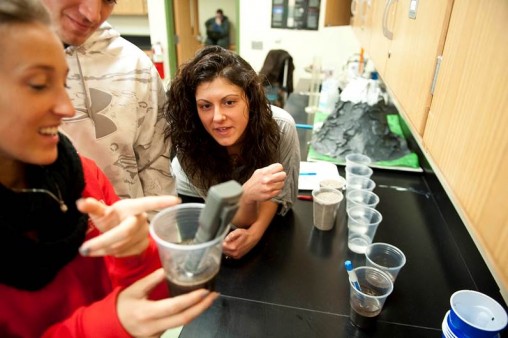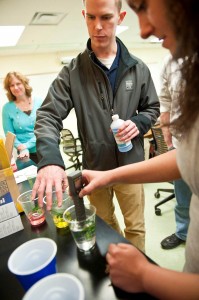
From left, Ashly Avery, James Smith and Athena Zois work with donated pH meters that will help Wright State education students develop skills critical to teaching how to preserve water quality.
Wright State students developing skills critical to teaching how to preserve water quality got a boost from a Yellow Springs company, which donated 10 pH meters to the university.
The instruments were delivered to early and middle childhood education majors at a lab in the College of Science and Mathematics’ Department of Earth and Environmental Sciences by YSI, which makes sensors, instruments, software and data collection platforms for environmental water quality monitoring and testing.
“Not only are they going to get to see the different pH ranges, but it also gives hands-on experience with instruments,” said Chris Cushman, assistant product manager for water quality systems at YSI. “You can read about it in textbooks, you can see it done, but to actually get your hands on it is a major part of the learning process.”
Stacey Hundley, Ph.D., earth and environmental sciences lecturer, said that having been exposed to the technology at Wright State, the students may use pH meters in future classrooms when working with young students.

Chris Cushman, assistant product manager for water quality systems at YSI and a Wright State graduate, helps a student use a donated pH meter.
Cushman said pH is the most fundamental, most measured parameter when it comes to water quality simply because it reveals so much information.
“There are a lot of pH-dependent processes in the environment,” he said. “It can tell you what processes are going on in your wastewater treatment plant. It can also tell you if there is contamination present, which is why they measure it so much in streams. And it is important in the production of drinks, production of bread.”
YSI recently released the ProDSS, a sophisticated system with titanium sensors and digital technology that not only measures pH, but also dissolved oxygen, conductivity, temperature and depth. Customers include universities and the U.S. Geological Survey.
Cushman, who graduated from Wright State with his bachelor’s and master’s degrees in earth and environmental sciences, once was a teaching assistant in the lab to which he delivered the pH meters.
“It’s wonderful to see his education has led him to a position at YSI, which provided the opportunity to return to Wright State and share his knowledge with others,” said Hundley. “We are very grateful for the donation of the pH meters and plan to use them in future classes.”
Cushman became interested in studying water quality simply because he grew up in the Beavercreek area over a buried valley aquifer and appreciated its importance.
“The issues that countries face in keeping their water clean and plentiful are challenging,” he said. “Training young scientists and giving them the tools to succeed is critical.”

 ‘Only in New York,’ born at Wright State
‘Only in New York,’ born at Wright State  Wright State president, Horizon League leaders welcome new commissioner
Wright State president, Horizon League leaders welcome new commissioner  Wright State celebrates homecoming with week-long block party
Wright State celebrates homecoming with week-long block party  Wright State baseball to take on Dayton Flyers at Day Air Ballpark April 15
Wright State baseball to take on Dayton Flyers at Day Air Ballpark April 15  Wright State joins selective U.S. Space Command Academic Engagement Enterprise
Wright State joins selective U.S. Space Command Academic Engagement Enterprise 